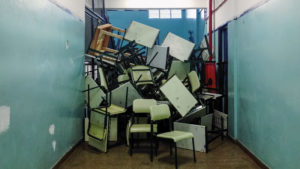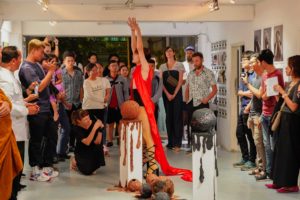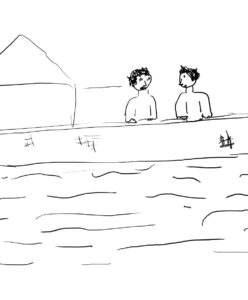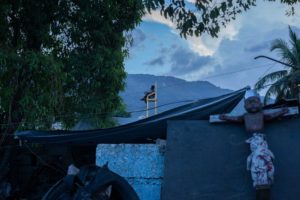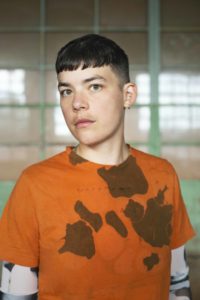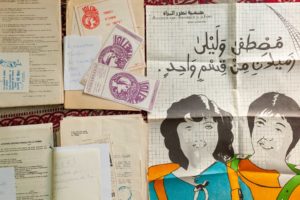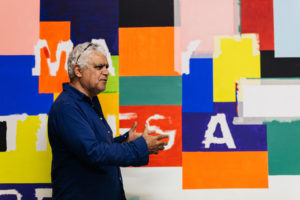The Instituto de Artivismo Hannah Arendt (INSTAR) was born out of an artistic action in Havana, Cuba, when, in May 2015, the artist and activist Tania Bruguera held a collective reading of Arendt’s The Origins of Totalitarianism (1951) in what are now INSTAR’s headquarters. For 100 hours, people recited and discussed Arendt’s classic study of totalitarian regimes, which is highly relevant to Cuba today.
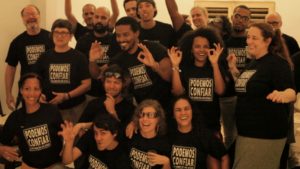
Instituto de Artivismo Hannah Arendt (INSTAR), Art to the limit, Workshop with the theoretician Brian Holmes and the artist Claire Pentecost, Havana, 2017, Photo: INSTAR
This action was the culmination of the #YoTambiénExijo campaign, which Bruguera initiated with a group of Cuban citizens in 2014–2015. They demanded transparency from the Cuban regime about conversations that established bilateral relations between Cuba and the United States during the terms of Raul Castro and Barack Obama, respectively. In an unprecedented event, within a few days, more than 20,000 people gathered on a public platform, activating a genuine civic campaign using social media. From that moment, the cultural sector became an agent of socio-political change in Cuba.
INSTAR—an acronym, and also a verb meaning “to encourage,” “to instigate,” or “to incite”—works at the fault lines between artistic practice and activism. The institute’s main objectives are the promotion of civic literacy and social justice in Cuba. Operating collectively and by consensus, it creates a model of institutionality guided by freedom of expression, the observance of human rights, and the fulfillment of labor rights such as fair working hours and wages, zero tolerance to discrimination, and favorable working environments for single-parent families. INSTAR is a space that generates content through programming, developed through social networks and at its Havana headquarters: it institutes and promotes awards and scholarships for the financial support of independent practice on the island; and it aims for the restitution of historical memory through public programs and the archive created for this purpose.
For documenta fifteen, INSTAR presents a counter-narrative of Cuban cultural history, installed between Havana and Kassel. The project takes as a point of departure the Russian constructivist poet, journalist, and playwright Sergei Tretyakov. Tretyakov believed that artists should not only reflect reality but shape its economic and labor conditions. For two years, Tretyakov lived on a kolkhoz, or collective farm, in the rural northern Caucasus. Interested in forms of social reorganization, he engaged in administrative duties, edited a newspaper, and worked with farmers on inventory, literacy, and accounting. In the kolkhoz he devised an information tool: a mural newspaper that helped the community coordinate and visualize their many activities. He called this information tool an “operational factography.”
INSTAR’s Operational Factography (2022) creates the conditions for the crossover and coexistence of projects and ideas that lead to the restitution of historical memory and its dynamization in the present. Integrating art, economics, literacy, and political engagement, INSTAR’s project takes place in two locations: at documenta Halle in Kassel, and in INSTAR’s Cuban headquarters. Viewers can access an operant archive of INSTAR’s activities and aims through ten exhibitions that INSTAR is putting on every ten days. Each show displays a specific project or or practice in Cuba, aiming to give justice to artists and intellectuals censored by the Cuban government.
Invited participants
Tania Bruguera
Carlos Cárdenas Cárdenas
Chris
Aminta D’Cardenas
Gretell Domenech
Solveig Front
Anaeli Ibarra
Hamlet Lavastida Lavastida
Camila Lobon
Leila Montero
Claudia Patricia Olivera
Leonardo Otaño
Ulises Padrón
Juliana Rabelo
Marta Maria Ramirez
